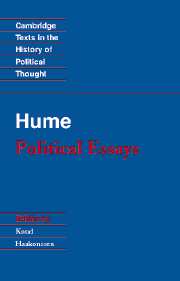Appendix: Excerpts from Hume's History of England
Published online by Cambridge University Press: 05 June 2012
Summary
I Parties and the Revolution settlement
The Petition of Right (History of England, ch. 41 (v: 192–5))
The … commons … knew, that their own vote … had not, of itself, sufficient authority to secure the constitution against future invasion. Some act to that purpose must receive the sanction of the whole legislature; and they appointed a committee to prepare the model of so important a law. By collecting into one effort all the dangerous and oppressive claims of his prerogative, Charles had exposed them to the hazard of one assault; and had farther, by presenting a nearer view of the consequences attending them, rouzed the independent genius of the commons. Forced loans, benevolences, taxes without consent of parliament, arbitrary imprisonments, the billeting of soldiers, martial law; these were the grievances complained of, and against these an eternal remedy was to be provided. The commons pretended not, as they affirmed, to any unusual powers or privileges: They aimed only at securing those which had been transmitted them from their ancestors: And their law they resolved to call a petition of right; as implying that it contained a corroboration or explanation of the ancient constitution, not any infringement of royal prerogative, or acquisition of new liberties.
While the committee was employed in framing the petition of right, the favourers of each party, both in parliament and throughout the nation, were engaged in disputes about this bill, which, in all likelihood, was to form a memorable aera in the English government.
- Type
- Chapter
- Information
- Hume: Political Essays , pp. 234 - 259Publisher: Cambridge University PressPrint publication year: 1994



